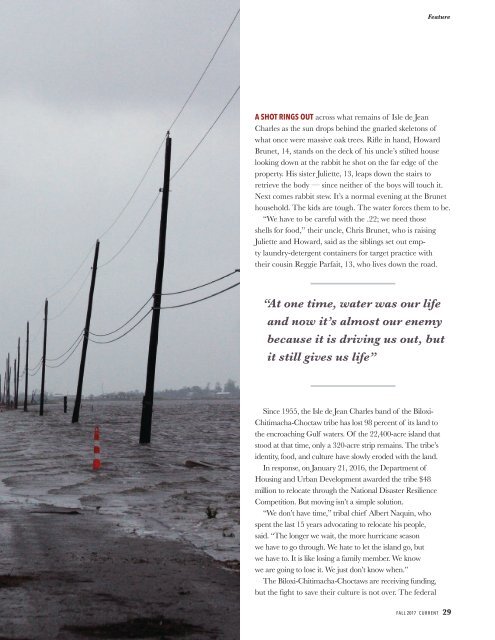Current Magazine
Create successful ePaper yourself
Turn your PDF publications into a flip-book with our unique Google optimized e-Paper software.
Feature<br />
A SHOT RINGS OUT across what remains of Isle de Jean<br />
Charles as the sun drops behind the gnarled skeletons of<br />
what once were massive oak trees. Rifle in hand, Howard<br />
Brunet, 14, stands on the deck of his uncle’s stilted house<br />
looking down at the rabbit he shot on the far edge of the<br />
property. His sister Juliette, 13, leaps down the stairs to<br />
retrieve the body — since neither of the boys will touch it.<br />
Next comes rabbit stew. It’s a normal evening at the Brunet<br />
household. The kids are tough. The water forces them to be.<br />
“We have to be careful with the .22; we need those<br />
shells for food,” their uncle, Chris Brunet, who is raising<br />
Juliette and Howard, said as the siblings set out empty<br />
laundry-detergent containers for target practice with<br />
their cousin Reggie Parfait, 13, who lives down the road.<br />
“At one time, water was our life<br />
and now it’s almost our enemy<br />
because it is driving us out, but<br />
it still gives us life”<br />
Since 1955, the Isle de Jean Charles band of the Biloxi-<br />
Chitimacha-Choctaw tribe has lost 98 percent of its land to<br />
the encroaching Gulf waters. Of the 22,400-acre island that<br />
stood at that time, only a 320-acre strip remains. The tribe’s<br />
identity, food, and culture have slowly eroded with the land.<br />
In response, on January 21, 2016, the Department of<br />
Housing and Urban Development awarded the tribe $48<br />
million to relocate through the National Disaster Resilience<br />
Competition. But moving isn’t a simple solution.<br />
“We don’t have time,” tribal chief Albert Naquin, who<br />
spent the last 15 years advocating to relocate his people,<br />
said. “The longer we wait, the more hurricane season<br />
we have to go through. We hate to let the island go, but<br />
we have to. It is like losing a family member. We know<br />
we are going to lose it. We just don’t know when.”<br />
The Biloxi-Chitimacha-Choctaws are receiving funding,<br />
but the fight to save their culture is not over. The federal<br />
FALL 2017 CURRENT 29





